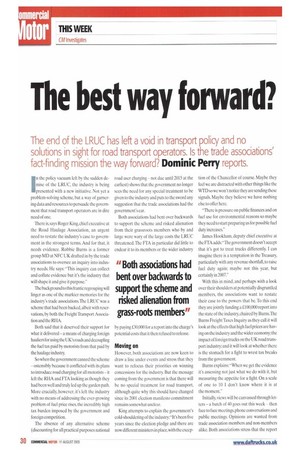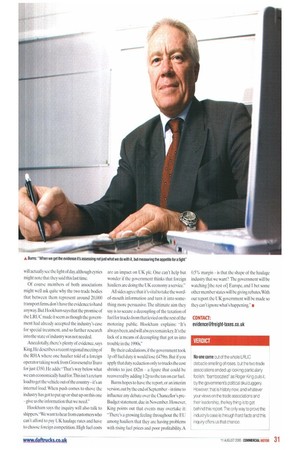The best way forward?
Page 30

Page 31

If you've noticed an error in this article please click here to report it so we can fix it.
The end of the LRUC has left a void in transport policy and no solutions in sight for road transport operators. Is the trade associations' fact-finding mission the way forward? Dominic Perry reports.
Inthe policy vacuum left by the sudden demise of the LRUC, the industry is being presented with a new initiative. Not yet a problem-solving scheme, but a way of garnering data and resources to persuade the government that road transport operators are in dire need of one.
There is says Roger King, chief executive at the Road Haulage Association, an urgent need to restate the industry's case to government in the strongest terms. And for that, it needs evidence. Robbie Burns is a former group MD at NFC UK drafted in by the trade associations to oversee an inquiry into industry needs. He says: This inquiry can collect and collate evidence but it's the industry that will shape it and give it purpose."
The background to this frantic regrouping will linger as one of the murkier memories for the industry's trade associations. The LRUC was a scheme that had been backed, albeit with reservations, by both the Freight Transport Association and the RHA.
Both said that it deserved their support for what it delivered — a means of charging foreign hauliers for using the UK's roads and decoupling the fuel tax paid by motorists from that paid by the haulage industry.
So when the government canned the scheme — ostensibly because it conflicted with its plans to introduce road charging for all motorists— it left the RHA and FTA looking as though they had been well and truly led up the garden path. More crucially, however, it's left the industry with no means of addressing the ever-growing problem of fuel price rises, the incredibly high tax burden imposed by the government and foreign competition.
The absence of any alternative scheme (discounting for all practical purposes national road user charging not due until 2015 at the earliest) shows that the government no longer sees the need for any special treatment to be given to the industry and puts to the sword any suggestion that the trade associations had the government's ear.
Both associations had bent over backwards to support the scheme and risked alienation from their grassroots members who by and large were wary of the large costs the LRUC threatened. The FTA in particular did little to endear it to its members or the wider industry by paying £30,000 for a report into the charge's potential costs that it then refused to release.
Moving on
However, both associations are now keen to draw a line under events and stress that they want to refocus their priorities on winning concessions for the industry. But the message coming from the government is that there will be no special treatment for road transport, although quite why this should have changed since its 2001 election manifesto commitment remains somewhat unclear.
King attempts to explain the government's cold-shouldering of the industry: "It's been five years since the election pledge and there are now different ministers in place, with the excep Lion of the Chancellor of course. Maybe they feel we are distracted with other things like the WTD so we won't notice they are sending these signals. Maybe they believe we have nothing else to offer here.
"There is pressure on public finances and on fuel use for environmental reasons so maybe they need to start preparing us for possible fuel duty increases."
James Hookham, deputy chief executive at the FTA adds:"The government doesn't accept that it's got to treat trucks differently. 1 can imagine there is a temptation in the Treasury, particularly with any revenue shortfall, to raise fuel duty again; maybe not this year, but certainly in 2007."
With this in mind, and perhaps with a look over their shoulders at potentially disgruntled members, the associations want to restate their case to the powers that be. To this end they are jointly funding a £100,000 report into the state of the industry, chaired by Burns.The Burns Freight Taxes Inquiry as they call it will look at the effects that high fuel prices are having on the industry and the wider economy; the impact of foreign trucks on the UK road transport industry: and it will look at whether there is the stomach for a fight to wrest tax breaks from the government.
Burns explains: "When we get the evidence it's assessing not just what we do with it, but measuring the appetite for a fight. On a scale of one to 10 I don't know where it is at the moment."
Initially, views will be canvassed through letters — a batch of 40 goes out this week — then face to face meetings, phone conversations and public meetings. Opinions are wanted from trade association members and non-members alike. Both associations stress that the report will actually sec the light of clay,although cynics might note that they said this last time.
Of course members of both associations might well ask quite why the two trade bodies that between them represent around 20,000 transport firms, don't have the evidence to hand anyway. But Hook ham says that the promise of the LRUC made it seem as though the government had already accepted the industry's case for special treatment, and so further research into the state of industry was not needed.
Anecdotally, there's plenty of evidence, says King. He describes a recent regional meeting of the RHA where one haulier told of a foreign operator taking work from Gravesend toTruro for just £350. He adds: "That's way below what we can economically haul for.This isn't a return load to get the vehicle out of the countryit's an internal load. When push comes to shove the industry has got to put up or shut up on this one give us the information that we need."
Hookham says the inquiry will also talk to shippers.-We want to hear from customers who can't afford to pay UK haulage rates and have to choose foreign competition. High fuel costs are an impact on UK plc. One can't help but wonder if the government thinks that foreign hauliers arc doing the UK economy a service."
All sides agree that it's vital to take the wordof-mouth information and turn it into something more persuasive. The ultimate aim they say is to secure a decoupling of the taxation of fuel for trucks from that levied on the rest of the motoring public. Hookham explains: "It's always been,and will always remain key.It's the lack of a means of decoupling that got us into trouble in the 1990s."
By their calculations, if the government took lp off fuel duty it would lose .E41:79m. But if you apply that duty reduction only to trucks the cost shrinks to just £82m a figure that could be recovered by adding I /2p to the tax on car fuel.
Burns hopes to have the report, or an interim version, out by the end of September-in time to influence any debate over the Chancellor's preBudget statement, due in November. However, King points out that events may overtake it: "There's a growing feeling throughout the Eli among hauliers that they are having problems with rising fuel prices and poor profitability. A 0.5% margin is that the shape of the haulage industry that we want? The government will be watching [the rest of] Europe, and I bet some other member states will be giving rebates. With our report the UK government will be made so they can't ignore what's happening." • CONTACT: evidence@freight-laxes.co.uk


































































































































































































